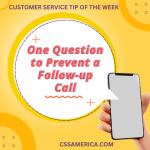 I was having a debrief call with one of my clients recently, and this was regarding a survey of employees who work events. One of the survey questions asked employees for advice on how to improve the customer experience. When the employees shared their input on the guest experience, comments were often worded like this:
I was having a debrief call with one of my clients recently, and this was regarding a survey of employees who work events. One of the survey questions asked employees for advice on how to improve the customer experience. When the employees shared their input on the guest experience, comments were often worded like this:
“The customers seemed to have a good time at the event, but they were griping and complaining when they arrived because of the parking issues.”
“They enjoyed the event, but a lot of fans had difficulty with mobile ticketing and couldn’t see the screens because of the bright sun.”
“They enjoyed the entertainment, but many complained about the heat and lack of shade.”
“Overall, customers had a good time, but the guests complained that the food ran out too soon.”
So overall, the entertainment was great, but the employees were fielding lots of complaints and dealing with lots of issues relating to processes, technology, concessions, or other issues.
Not only were the employees having to deal with difficult processes and address complaints, but the frustrations of these guests were being transferred to the employees. The employees had more work to do because of these issues, and they themselves became frustrated and upset just like the guests.
As an employee, what can you do when you’re getting hammered by process and experiential complaints even though you might be doing a great job?
First, be clear to yourself that the complaint about these items is not a complaint about you. Understand that truth, and by taking things less personally, it’s easier to control your emotions.
Second, focus on listening, and provide a little empathy. Don’t feel like you have to counter every complaint with a comeback. If you focus on listening and understanding, it takes away the burden of your having to respond to every criticism or always saying the right thing. In these situations, sometimes the less you can say, the better it is for all parties.
Finally, help the company to improve. Very few organizations are good at tapping into the voice of the employee to seek the voice of the customer like our client has done through this research. If you’re not asked to share customer feedback, proactively find ways to share those common themes – those common positives and concerns that you’re hearing from customers – with leaders on your work team.
Be kind to yourself even when the customer isn’t being so kind.
Signup for FREE Tips! Contact Us More Resources for You Visit Our Home Page























